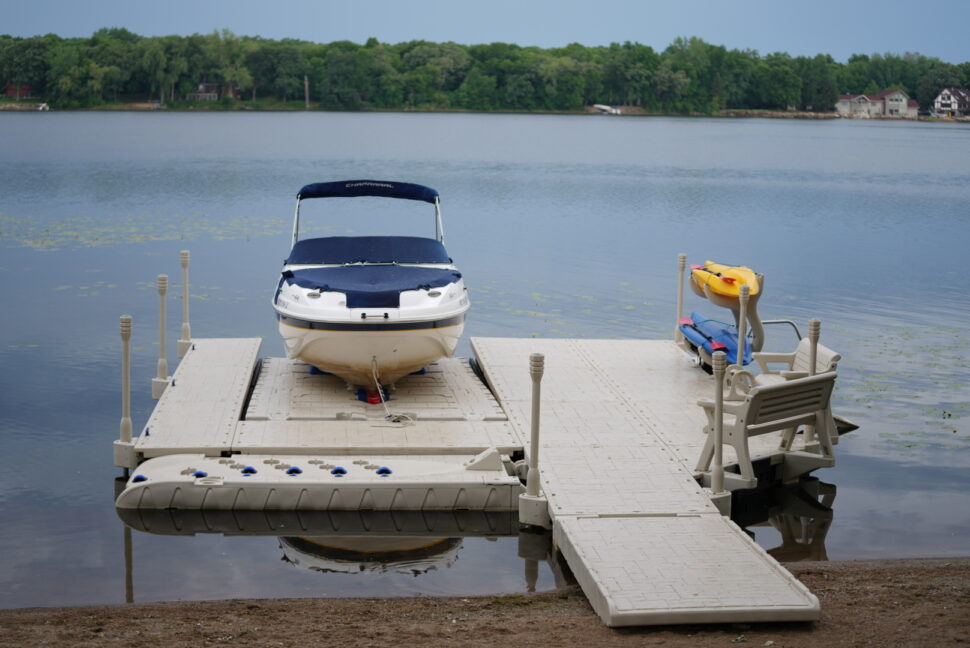Why Choose Floating Docks Over Wood or Aluminum Docks?
If you own a waterfront property, having a boat dock is essential for enjoying water activities such as fishing, boating, swimming, and sunbathing. However, choosing the right type of boat dock is crucial. There are several types of boat docks available, including wooden, aluminum, and floating docks. In this blog post, we will discuss why floating docks are the best choice for your waterfront property.

Durability
One of the most significant benefits of floating docks is their durability. Floating docks are constructed using high-density polyethylene (HDPE) plastic, which is known for its exceptional durability and resistance to damage from the elements. HDPE plastic is highly resistant to moisture, rot, and corrosion, making it an ideal material for boat docks.
Wooden and aluminum docks are also popular choices, but they are not as durable as floating docks. Wooden docks are prone to rotting, warping, and splintering over time. Aluminum docks are also prone to corrosion and can become damaged by the sun’s UV rays. Floating docks, on the other hand, are designed to withstand all types of weather conditions and require very little maintenance.
Stays Level
Water levels can fluctuate several inches, if not feet, year to year and you never want water to come over the top of your dock. With aluminum and wooded docks, you need to constantly evaluate the platform height from the water and modify leg heights as needed. By not monitoring your aluminum or wooden with fluctuating waters you could find yourself with a submerged dock that is inaccessible or a dock that is uneven with its lift or port.
Luckily, floating docks naturally rise and fall with the water levels and require no modifying and minimal maintenance. Regardless if you live on a lake, river, canal, bay, or ocean, floating docks are capable of all water types and allow you to enjoy your waterfront no matter the condition.
Ease of Installation
Another advantage of floating docks is their ease of installation. Unlike wooden or aluminum docks, which require significant labor and time to install, floating docks are relatively simple to set up. Floating docks are prefabricated in a factory and delivered to your property. Once they arrive, they are easily assembled and installed using basic tools.
Traditional wooden or aluminum docks require more labor, time, and specialized equipment to install. You may also need to hire a professional contractor to install them correctly. Floating docks are designed to be installed by anyone with basic DIY skills, making them an ideal choice for homeowners who want to save time and money on installation.
Low Maintenance
One of the most significant benefits of floating docks is their low maintenance requirements. Floating docks are designed to require very little maintenance, making them an ideal choice for homeowners who want to spend more time enjoying their waterfront property and less time maintaining it.
Traditional wooden or aluminum docks require significant maintenance to keep them in good condition. Wooden docks require regular staining and sealing to prevent rot and decay. Aluminum docks require regular cleaning and painting to prevent corrosion. In contrast, floating docks require very little maintenance. You can simply clean them with soap and water or a pressure washer to keep them looking their best.
Customization
Another advantage of floating docks is their customization options. Floating docks are designed to be highly customizable, allowing you to choose the size, shape, and layout that best fits your needs. You can add a variety of accessories such as bumpers, cleats, and ladders to your floating dock to make it more functional and enjoyable.
Wooden or aluminum docks have limited customization options. They are typically available in standard sizes and shapes, limiting your ability to customize them to your liking. Floating docks, on the other hand, can be customized to fit any size or shape, allowing you to create a boat dock that perfectly meets your needs.
Cost-Effective
Finally, floating docks are a cost-effective choice for your waterfront property. While they may have a slightly higher upfront cost than traditional wooden or aluminum docks, they are more cost-effective in the long run. Floating docks require very little maintenance, reducing your ongoing maintenance costs. They are also highly durable, which means you won’t have to replace them as often as traditional wooden or aluminum docks.
Conclusion
In summary, choosing a floating dock for your waterfront property is an excellent choice. Floating docks are highly durable, easy to install, require low maintenance, offer customization options, and are cost-effective in the long run. If you’re looking for a boat dock that will last for many years and require very little maintenance, a floating dock is the perfect choice for you.